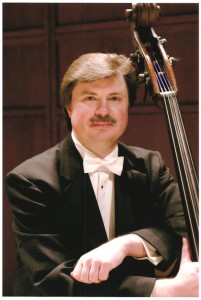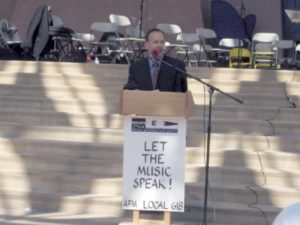
Photo credit: Michael Zirkle
The 2009 ICSOM Conference in Norfolk, Virginia, was one of the most unifying and uplifting events that I have ever experienced in my 30-year career as a orchestral instrumentalist. But as the late Richard Totusek would say, time only moves in one direction. In the three months since our gathering, much has happened. We all must be engaged with these events in order to positively influence the future of our field.
When I first began to practice my instrument seriously as a teenager, I had one of those trite drug-store bought inspirational post cards that I kept on my music stand that said, “My future depends on me.” I suppose I have both lived up to that charge and also at times let myself down. But as we build upon the remarkable unity of ICSOM that was demonstrated at our Conference, we all must feel that the future depends on all of us. We must react and build upon the advocacy for our field. With that in mind, I’d like to offer a few desultory thoughts on recent events.
1. In a time when many of our orchestras have faced concessions, several have continued to thrive even in this difficult economy. Strong musician leadership, talented managers, engaged boards, and innovative programming have demonstrated the relevancy and sustainability of symphonic music in America. Still, the field will continue to initiate self-study, searching for reasons why some orchestras are not succeeding. These studies will inevitably conclude that we are in a “new economic reality,” and that a new model must be developed. Many musicians would be more supportive of that if they had actually seen the current model implemented well. What these studies can never adequately measure is the skill and engagement of those currently running our organizations.
Some orchestras have responded to the economic downturn by offering a lackluster season to their audiences. When the response of an audience is to not show up, it can’t be much of a mystery why. I read a recent, scathing review of one orchestra’s programming that lamented the evening’s offerings of “nugatory trifles” while reporting that the pieces were “greeted by feeble applause, as they deserved.” The programming required no extra musicians, though. No doubling either. It was cheap to produce, and that fact was apparent to an audience that had left their homes to support their symphony. As the reviewer wrote, “These (pieces) might be pleasant for drive time, but to actually buy a ticket to listen to these nothings seems over the top.”
In his recent book, The Art of the Turnaround: Creating and Maintaining Healthy Arts Organizations, Michael Kaiser writes:
I realized that most organizations in trouble get that way because they react to an initial financial problem inappropriately. When any financial problem emerges, the first reaction of most boards and staff is to reduce expenditures. The easiest expenses to cut are the most discretionary areas of spending: artistic ventures and marketing…. However, when arts organizations cancel artistic and marketing initiatives, they begin to lose the interest of their supporters, both donors and audience members. As a result, less revenue is received and further cut backs are made. This begins a vicious spiral that cripples arts organizations.
We are seeing orchestras make this mistake. I’ve recently had the opportunity to spend a great deal of time with musicians in two of our nation’s great orchestras. I’ve listened to their ideas for reaching to the community and maintaining and elevating the profile of their city’s orchestras while increasing community service. Our orchestras are filled with musicians with innovative ideas. Our managements should be eager to listen to them—and then our managements should be capable of inspiring our boards.
People contribute to things that inspire them to contribute. Inspiration leads believers to provide support for political campaigns and to causes that serve a need. Inspirational leaders build organizations that accomplish great things for the world, even in times of difficulty. Our field needs more inspirational leaders, and no amount of money invested in the same old studies of sustainability can ever make up for what is lost when an organization lacks a visionary, dynamic leader.

ICSOM President Brian Rood traveled to Albuquerque to speak at a rally on behalf of New Mexico Symphony Orchestra musicians on September 28.
2. We have all been following the events in Albuquerque, where our friends and colleagues in the New Mexico Symphony Orchestra (a member orchestra of the Regional Orchestra Players’ Association) were fighting for their orchestra and its great history. As this issue of Senza Sordino goes to print, we have learned that the musicians have accepted a settlement. While there were many issues involved there, perhaps the most notorious is the fact that the musicians’ health insurance was cut off, and yet the management did not inform the musicians for approximately ten days. We have seen health insurance used as a negotiating tactic before, but perhaps never as egregiously as this. It would seem obvious that any organization that thinks it appropriate to place the health of its employees and their families at risk by cutting off health insurance—let alone without informing them—will have difficulty inspiring success and promoting growth.
ICSOM was pleased to be able to show our support for our New Mexico Symphony Orchestra colleagues at a rally in downtown Albuquerque on September 28. ICSOM President Brian Rood delivered a speech in support of the musicians. In his remarks President Rood made the following points:
The very future of the New Mexico Symphony Orchestra is now at stake. Management and board leadership somehow suggest that the solution to their current financial issues is to make immediate and drastic cuts. These cuts would reverse the incredible artistic strides achieved though years of collaboration and would result in a vastly inferior product. If accepted, management’s last offer to the musicians would result in an annual wage less than they received 18 years ago in 1991–1992 and would also be less than half of the current per capita income.
The full text of President Rood’s remarks can be found on the Facebook page of the New Mexico Symphony Players Association, and we encourage you all to visit that page and join their growing list of supporters.
3. The American Federation of Musicians and Employers’ Pension Fund (AFM-EPF) continues to suffer, and the multiplier was recently reduced to $1, another 50% cut in benefits. Further, due to a new rule imposed by the trustees, it appears our orchestras have now lost the ability to reduce pension contributions during this time of economic cutbacks. This new rule seems to mandate that any contribution reduction by an orchestra would result in expulsion from the fund. But, really, much of this is not clear, and, as of early December, the AFM-EPF has yet to inform individual plan participants of changes by hard copy mailing, even though initial word came on October 16.
In that time, however, the president of the Federation somehow managed to respond to a mailing by the Recording Musicians Association (RMA) that was critical of his handling of a national media negotiation. The RMA, in its criticism, maintained that the duly elected leaders of that Player Conference had not been adequately involved in the negotiation of an agreement that they will be working under. The president’s response to this criticism was nearly 1,300 words long and contained four attachments! At this time of crisis for our orchestras and for the AFM-EPF, is this really how we expect our leaders to be using their time, and our union’s resources?
4. As I write this, news continues to break from Honolulu about the possibility of bankruptcy for that great orchestra, an orchestra that has persevered since 1900. The oldest symphony west of the Rocky Mountains—one that managed to survive both world wars, the Great Depression, and numerous recessions—has also inspired generations of Hawaiians. We will all stay in touch with this situation as it develops. I have had the honor of visiting with the musicians of the Honolulu Symphony on two occasions, most recently just two years ago. But in 1996, long before I was chair of ICSOM, I spent 10 days performing with the orchestra, and during that time I learned all I needed to know about commitment, service, artistry, and investment. I met a group of musicians completely dedicated to serving their community. One evening, they allowed me the courtesy of observing a meeting on-stage at the Blaisdell Center. What I heard and learned there convinced me of the importance of musicians investing in their community as we ask our communities to invest in us. ICSOM will be seeking ways to assist our friends and colleagues during this time.
I reminisced at the start of this article about a trite saying that inspired me as a kid. It may be trite, but it is also true. Change will come when you demand it, and when we demand it collectively. We must have managers who understand the field and can inspire a community, let alone their own office. And we must have a union that seeks to serve its dues paying members in their greatest time of need.
The future can be strong, but that future depends on us.





